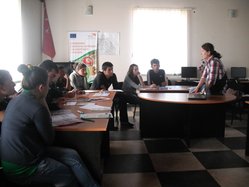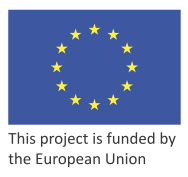 One of the objectives of Cross Border Cooperation for HIV/AIDS Prevention and Impact Mitigation is Southern Caucasus and Russian Federation project is HIV prevention through awareness raising and mobilization of target mobile and most-at-risk populations in the target communities. To reach the given target a number of outreach sessions and trainings are planned to be delivered to the migrants, their family members and other populations at risk during 2 years of project implementation.
One of the objectives of Cross Border Cooperation for HIV/AIDS Prevention and Impact Mitigation is Southern Caucasus and Russian Federation project is HIV prevention through awareness raising and mobilization of target mobile and most-at-risk populations in the target communities. To reach the given target a number of outreach sessions and trainings are planned to be delivered to the migrants, their family members and other populations at risk during 2 years of project implementation.
In the month of September (2012) Real People Real Vision(project local partner in Georgia) organized two outreach sessions in Batumi (Adjara region) and another two in Mokhisi and Metekhi communities (Shida Kartli region). Both outreach sessions were aiming to form a strong network of peers by delivering peer education trainings and introductory sessions on HIV/AIDS and Migration to project target beneficiaries, including Men having Sex with Men, Commercial Sex Workers, migrants’ family members and active community representatives.
The sessions involved interactive discussions giving the audience the opportunity to brainstorm and identify the problems and risks linked to migration on their own. The participants from both regions stated that they see Migration as one of the risk factors of HIV transmission. Some of the attendants from Mokhisi (IDP Settlement in Shida Kartli) outreach session even provided their personal examples of being victims of labor exploitation in Turkey. The youth particularly emphasized the hazards of illegal migration and highlighted that their peers among their community are at risk to migrate illegally due to economic hardship in their particular region.
Participants were highly motivated to share gained information among their peers in Batumi and Shida Kartli, and as already trained peer educators they plan to raise awareness using the following method of peer education:
- What? (they know the topic).
- Why (reason to spread the information).
- When &Where (peers should be able to give information of existed services in the country (if necessary) in their community).
It should be noted that the facilitator (RPRV Project Coordinator) of the stated sessions gave the participants opportunity to link migration with HIV/AIDS risks themselves, rather than merely provide them with theoretical and statistical data. The fact that the residents of project target communities are consciously or subconsciously aware of migration related hazards and perceive their needs to receive more information in this regards was a significant finding made during the activity.


